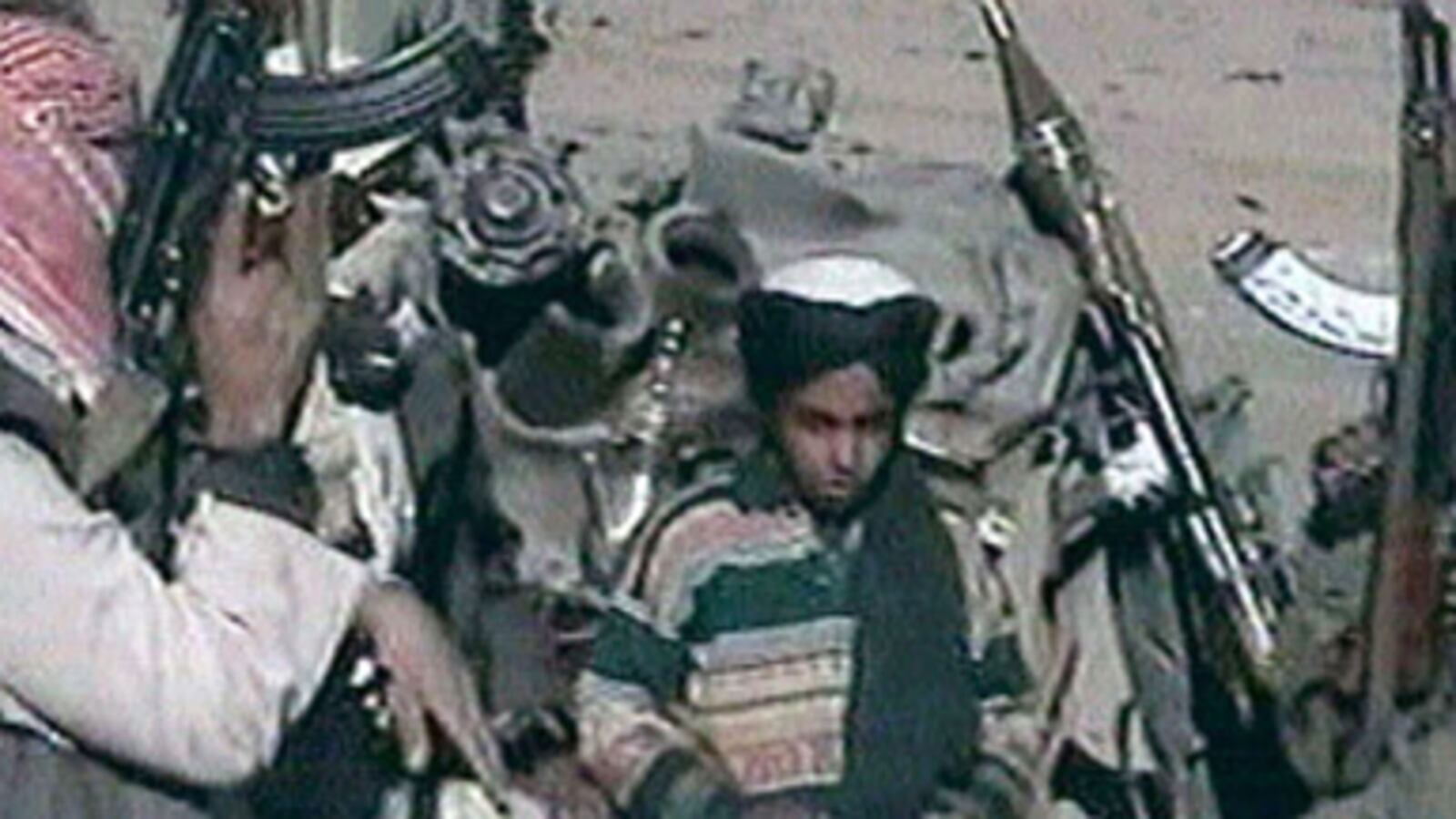Pakistan officials say Hamza bin Laden, perhaps Osama's most militant son, escaped the raid that killed his father. David A. Graham reports on why having this bin Laden on the loose could be dangerous. Plus, full coverage of Osama bin Laden's death.
Hamza bin Laden was supposed to be a dead man. As the Obama administration made jubilant remarks in the wake of Osama bin Laden's death, counterrorism adviser John Brennan told reporters that the young man had been killed alongside his father.
Then the story changed: It was Khaled bin Laden, not Hamza, who was killed. That might have been the end of the story, but now reports out of Pakistan suggest the tale is even more elaborate: Not only was Hamza not killed, but he escaped in the midst of the raid.

Whether that's true is still hotly contested. Pakistani officials say that one of bin Laden's wives said a son had escaped, and that they had come to believe it was true. The U.S. insists there's no way that anyone got away. If Hamza did flee, though, it could be bad news for the world: The young man—a dead ringer for his father—is perhaps the most militant scion of the bin Laden family, a violent, seasoned jihadist before his 18th birthday who is known as " the Crown Prince of Terror."
Born in Jeddah, Saudi Arabia, in 1989, Hamza is the spitting image of his father; in jihadist videos, the similarities in their facial features are accented by the camouflage vest, white turban, and automatic rifle he sports, so that he resembles a scaled-down, baby-faced version of the al Qaeda chief. He is the only son of his father's favorite wife Khairiah Sabar, who was known as Umm Hamza, meaning mother of Hamza, and his father's favor reportedly fell on her child as well. (Umm Hamza is believed to be one of the bin Laden widows who have been detained by Pakistan.)
Hamza is a dead ringer for his father, and a seasoned jihadist known as “the Crown Prince of Terror.”
The bin Laden children are a mixed batch. At least two of his sons, including Khaled, have died because of their terror activities. Another, Omar, went to Syria with his mother just before the 9/11 attacks and has condemned his father's terrorism—although he also issued a statement Tuesday blasting the U.S. for its "arbitrary killing" of Osama bin Laden. And according to news reports, a will Osama wrote shortly after 9/11 enjoined his children from joining the jihad.
Hamza, however, was different. In Growing Up Bin Laden, Omar bin Laden recalled traveling to Afghanistan with young Hamza when the family was expelled from Sudan in 1996. In 2000, his half-brother, Muhammad, married the daughter of a mujahid, and Hamza read a poem, Lawrence Wright wrote in The Looming Tower. "What crime have we committed to be forced to leave our country?" the boy recited to cheers. "We will fight the kafr [infidels] forever!"
A report in the Ottawa Citizen said he'd been wounded shortly after 9/11 by bounty hunters who were pursuing Osama bin Laden. By 2003, there were already rumors that he was fighting. Just after the attacks in New York, Washington, and Pennsylvania, Al Jazeera aired footage of several bin Laden boys in a Taliban camp, and Pakistan claimed in 2003 that it had wounded and captured both Hamza and his older half-brother, Saad, during fighting in Baluchistan, a restive region in the country's west. But the report turned out to be false. (Saad was killed by a Predator drone in 2009.)
In 2005, Hamza gained Internet fame when he appeared in a video called " 1=LKVR5&FORM=LKVR8">The Mujahideen of Waziristan," which showed Taliban or al Qaeda fighters skirmishing with Pakistani forces near the Afghanistan-Pakistan border (the full video runs some 19 minutes). At the start of the video, Hamza, just 14, can be seen speaking in what appears to be Dari or Pashto, according to Bruce Lawrence, a professor of Islamic studies at Duke University, and wearing a camouflage coat and headband and cradling a rifle. In the fight that followed, several Pakistani soldiers were killed.
And he's popped up repeatedly since that bloody debut turn. Before her death, Benazir Bhutto named him as a conspirator in a plot to assassinate her. In 2008, a poem asking that God destroy the United States appeared on the Web, attributed to him. Omar stated in Growing Up Bin Laden that the recording was authentic, but had been made years prior, before the 9/11 attacks. Other videos use Hamza's voice and show footage of him reading a poem, running drills in a camp—young but eager and clad in fatigues—and leading a group of uniformed boys about his age in chants.
Although his already lengthy résumé has earned him the mantle of "Crown Prince of Terror," the label isn't perfect. No one expects Hamza, now 21, or any of his siblings to take over al Qaeda, with that task likely going to a more experienced leader such as Ayman al-Zawahri (who once took care of the little boy after part of a crumbling Afghan building fell on him). But the charisma that made Hamza a star of jihadist videos as mascot-cum-warrior could translate into even greater fame as he matures into a battle-hardened mujahid, cultivates his ties with al Qaeda's highest levels, and gains new status as the son of the martyred Osama bin Laden. His father's death may be a relief to the U.S., but whether Hamza escaped from his father's compound or wasn't there to begin with, the son may soon be a thorn in the American side in his own right.
David Graham is a reporter for Newsweek covering politics, national affairs, and business. His writing has also appeared in The Wall Street Journal and The National in Abu Dhabi.




